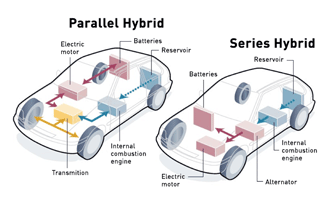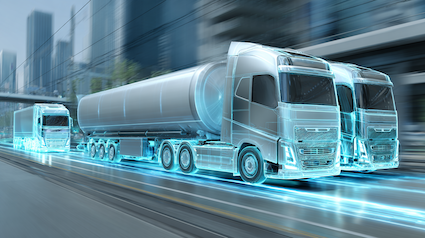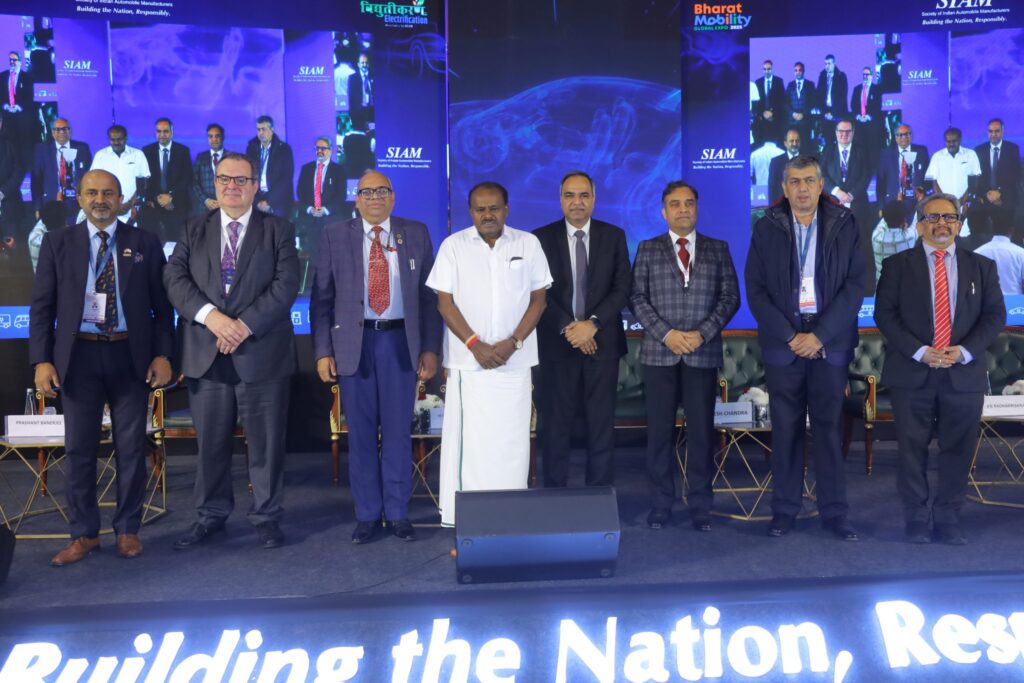Explore more updates from across the automotive world.
- Autos and Fuels
Hybrid
Two main types of hybrid-electric vehicles exist, and they have different advantages and different applications, but both have fuel efficiency advantages over conventional internal combustion engined vehicles.

Share this article
LinkedIn
Facebook
X

OICA
Two main types of hybrid-electric vehicles exist, and they have different advantages and different applications, but both have fuel efficiency advantages over conventional internal combustion engined vehicles.
Parallel hybrids can run simply on battery power when zero emissions are required – say in the city – and purely on their parallel internal combustion engine for higher speeds and/or longer distances. In this mode they can also recharge the battery for the next phase of battery operation. In addition they can usually use both power sources together to give additional acceleration, and this means that the internal combustion engine can be relatively small and low powered, and largely avoid inefficient “transient” operation, because of the boost provided by the battery power.
Series hybrids run solely on battery power in all conditions, with a relatively small internal combustion engine available to recharge the batteries when zero-emissions are not required and to act as a “range extender”.
Because the internal combustion engine is only driving a generator, it can run at a constant speed and reasonably constant load, which is very efficient.
The Fuel Cell is a means of converting the chemical energy in a fuel directly into electricity, very efficiently, without any burning, which is a wasteful process with undesirable side effects (like pollutants).
The fuel cell principle has been known for many years but they only became usable devices thanks to the space race – NASA developed usable fuel cells to provide safe, clean efficient electricity generation in space craft and other organisations, including auto manufacturers, have further developed them for commercial use.
Although fuel cell vehicles (FCVs) are still an emerging technology and are not likely to be in mass production for some years yet, they are seen by many as the long term solution for personal transportation energy. Fuel cells have the potential to very significantly reduce energy use and pollution and also to reduce our dependence on fossil fuels.
Like series hybrids, FCVs operate solely on electric power, but in this case there is no need for a battery or an internal combustion engine as the fuel cell does the job of both, and it does so more efficiently.
FCVs are fuelled with hydrogen, either stored on board, under pressure or in liquefied form, or converted from hydrogen-rich fuels; such as methane (CNG) or methanol, using an onboard device called a “reformer.;
FCVs fuelled with pure hydrogen emit no pollutants; only water and heat; while those using hydrogen-rich fuels and a reformer produce only small amounts of pollutants.
Source: www.fueleconomy.gov


Other News

- OICA News

OICA
88th Session. INLAND TRANSPORT COMMITTEE, Driving Innovation for the Future of Inland Transportation
18-20 February 2026 – Palais des Nations, Geneva,
Speech OICA, François Roudier

- OICA News

OICA
OICA celebrates its 200th Technical Committee, marking 70 years at the heart of global automotive regulation
The Committee was established in 1956 to support the implementation of the forthcoming 1958 Agreement of the United Nations Economic Commission for Europe (UNECE).

- OICA News

OICA
New Zealand's Motor Industry Association goes global with OICA membership
New Zealand’s Motor Industry Association has become a full OICA member, strengthening global collaboration and ensuring the Asia-Pacific region’s perspectives are represented in international automotive discussions.

- OICA News

OICA
Automobile: ANAC Chile Joins OICA as New Member
Paris – Santiago: The OICA Organisation Internationale des Constructeurs Automobiles is pleased to announce that ANAC (Asociación Nacional Automotriz de Chile) has officially joined OICA as a full member, further expanding the global reach and diversity of the association’s network.

- OICA News

OICA
Shailesh Chandra, President of OICA, Hildegard Müller, Vice President
OICA announces the election of Shailesh Chandra, President of the Society of Indian Automobile Manufacturers (SIAM), as its new President, effective November 1, 2025, succeeding John Bozzella, President and CEO of the Alliance for Automotive Innovation (USA).

- OICA News

OICA
Pragmatic and successful decarbonization of road transport
The Strategic Role of Sustainable Fuels including Biofuels and Technological Diversity

- Autos and Fuels

OICA
Hybrid
Two main types of hybrid-electric vehicles exist, and they have different advantages and different applications, but both have fuel efficiency advantages over conventional internal combustion engined vehicles.

- Media Center, OICA News

OICA
OICA Launches New Roadmap for Motor Show Activities
IAA, Munich, September 10, 2025 – The International Organization of Motor Vehicle Manufacturers (OICA) today announced a renewed structure and vision for its motor show activities, reflecting the evolving needs of the global automotive industry and the motor show ecosystem.

- Media Center

OICA
UNECE, the 87th session of the Inland Transport Committee (Geneva, February 11, 2025)
It is a privilege and a pleasure to address you today as the new Secretary General of OICA, the International Organization of Motor Vehicle Manufacturers.

- Media Center, OICA News

OICA
François Roudier Speech @ Bharat Mobility January 2025
Honourable Minister Kumaraswamy, dear Members of SIAM, distinguished guests, ladies and gentlemen, and fellow enthusiasts, Good morning.
- General

OICA
IAA TRANSPORTATION 2024 Sets New Records and Delivers a Clear Message: The Industry Impresses with Market-Ready Innovative Products, Government Needs to Enable Progress Through Infrastructure Initiatives
145 world premieres demonstrate the impressive innovation of the industry – Visitors and exhibitors delighted and highly satisfied – IAA TRANSPORTATION is more international than ever – Record bookings for test drives – From talk to action: Policy makers must develop and implement a concrete action plan focusing on infrastructure
- Media Center

OICA
François Roudier @ China Auto Forum 2024 : “The never-ending automotive revolution”
Good morning, and thank you for being here today. As we stand at the crossroads of innovation and tradition, it is important to remember the incredible journey of the automobile and the constant revolution it represents.
- Media Center

OICA
François Roudier appointed Secretary General of OICA and Olivier Fontaine, Technical Director
Paris, France – May 13, 2024 – OICA – the International Organization of Motor Vehicle Manufacturers – is pleased to announce the appointment of François Roudier as its new Secretary General, effective June 1, 2024.
